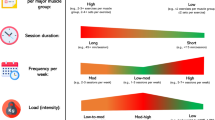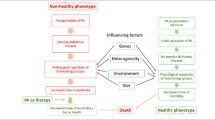Abstract
Background
Exercise has been shown to reduce fatigue in early breast cancer survivors (EBCS), though it is unclear if these results translate to community-based exercise settings. Mechanisms that influence changes in fatigue seen after exercise are also poorly understood. This study sought to evaluate the impact of community-based exercise and identify associations of fatigue in EBCS.
Methods
Twenty-nine EBCS and 13 non-cancer controls (CON) enrolled. Pre/post-intervention measurements included measures of fitness/function, balance, and adherence/compliance as well as self-reported measures of fatigue, health-related quality of life (HRQOL), well-being, self-efficacy, and physical activity. Both groups participated in a supervised 16-week aerobic + resistance exercise intervention. A mixed model ANOVA and Cohen’s D effect size assessed fatigue changes, and univariable linear regressions identified fatigue associations.
Results
Fatigue improved for EBCS (– 2.6, Cohen’s D = 0.51) but not CON (0.0, Cohen’s D = 0.02); no interaction effect was observed. Post-intervention fatigue in EBCS was associated with better QOL (R2 = 0.387; p < 0.01), depression (R2 = 0.251; p < 0.01), self-efficacy, (R2 = 0.453; p < 0.01), outcome expectations from exercise (R2 = 0.254; p < 0.01), balance (R2 = 0.167; p < 0.05), and the 6-minute walk test (R2 = 0.193; p < 0.05). EBCS improvements in fatigue were associated with improvements in self-reported physical health (R2 = 0.425; p < 0.01), depression (R2 = 0.233; p < 0.01), pain (R2 = 0.157; p < 0.05), outcome expectations from exercise (R2 = 0.420; p < 0.01), and the 6-minute walk test (R2 = 0.172; p < 0.05). Less fatigue in the CON group was shown be associated with better sleep quality (R2 = 0.309; p < 0.05) and pain (R2 = 0.259; p < 0.05).
Conclusion
Community-based exercise appears beneficial for alleviating fatigue in EBCS. These improvements may be driven by parallel improvements in psychosocial outcomes and objectively measured functional outcomes.



Similar content being viewed by others
References
Siegel RL, Miller KD, Fuchs HE, Jemal A. Cancer statistics, 2021. CA A Cancer J Clin. 2021;71:7–33.
Nyrop KA, Deal AM, Shachar SS, Basch E, Reeve BB, Choi SK, et al. Patient-reported toxicities during chemotherapy regimens in current clinical practice for early breast cancer. Oncol US. 2019;24:762–71.
Jones LW, Courneya KS, Mackey JR, Muss HB, Pituskin EN, Scott JM, et al. Cardiopulmonary function and age-related decline across the breast cancer survivorship continuum. J Clin Oncol. 2012;30:2530–7.
Bower JE, Ganz PA, Desmond KA, Bernaards C, Rowland JH, Meyerowitz BE, et al. Fatigue in long-term breast carcinoma survivors: a longitudinal investigation. Cancer. 2006;106(4):751–8.
Matias M, Baciarello G, Neji M, Di Meglio A, Michiels S, Partridge AH, et al. Fatigue and physical activity in cancer survivors: a cross-sectional population-based study. Cancer Med. 2019;8(5):2535–44.
Winters-Stone KM, Bennett JA, Nail L, Schwartz A. Strength, physical activity, and age predict fatigue in older breast cancer survivors. Oncol Nurs Forum. 2008;35(5):815–21.
Charalambous A, Kouta C. Cancer related fatigue and quality of life in patients with advanced prostate cancer undergoing chemotherapy. Biomed Res Int. 2016;2016:3989286.
Romero SAD, Jones L, Li QS, Mao JJ, Bauml JM, Cohen RB. The association between fatigue and pain symptoms and decreased physical activity after cancer. Support Care Cancer. 2018;26(10):3423–30.
Kneis S, Wehrle A, Freyler K, Lehmann K, Rudolphi B, Hildenbrand B, et al. Balance impairments and neuromuscular changes in breast cancer patients with chemotherapy-induced peripheral neuropathy. Clinical Neurophysiol. 2016;127:1481–90.
Minton O, Alexander S, Stone PC. Identification of factors associated with cancer related fatigue syndrome in disease-free breast cancer patients after completing primary treatment. Breast Cancer Res Treat. 2012;136:513–20.
Inglis JE, Janelsins MC, Culakova E, Mustian KM, Lin P-J, Kleckner IR, et al. Longitudinal assessment of the impact of higher body mass index on cancer-related fatigue in patients with breast cancer receiving chemotherapy. Support Care Cancer. 2020;28:1411–8.
Adams SC, DeLorey DS, Davenport MH, Fairey AS, North S, Courneya KS. Effects of high-intensity interval training on fatigue and quality of life in testicular cancer survivors. Br J Cancer. 2018;118(10):1313–21.
Battaglini CL, Dennehy CA, Groff D, Kirk D, Anton PM. Complementary therapies in the management of cancer treatment- related symptoms: the individualized prescriptive exercise intervention approach. Medicina Sportiva. 2006;10(1/4):49.
Mustian KM, Alfano CM, Heckler C, Kleckner AS, Kleckner IR, Leach CR, et al. Comparison of pharmaceutical, psychological, and exercise treatments for cancer-related fatigue: a meta-analysis. JAMA Oncol. 2017;3:961–8.
Campbell KL, Winters-Stone KM, Wiskemann J, May AM, Schwartz AL, Courneya KS, et al. Exercise guidelines for cancer survivors: consensus statement from international multidisciplinary roundtable. Med Sci Sports Exerc. 2019;51:2375–90.
Covington KR, Hidde MC, Pergolotti M, Leach HJ. Community-based exercise programs for cancer survivors: a sco** review of practice-based evidence. Support Care Cancer. 2019;27:4435–50.
Wagoner CW, Lee JT, Battaglini CL. Community-based exercise programs and cancer-related fatigue: a systematic review and meta-analysis. Support Care Cancer. 2021;29(9):4921–9.
Agbejule OA, Hart NH, Ekberg S, Bogda K, Ladwa R, Simonsen C, et al. Bridging the research to practice gap: a systematic sco** review of implementation of interventions for cancer-related fatigue management. BMC Cancer. 2021;21:809.
Lee JT, Wagoner CW, Sullivan SA, Amatuli DJ, Nyrop KA, Hanson ED, et al. Impact of community-based exercise program participation on aerobic capacity in women with and without breast cancer. World J Clin Oncol. 2021;12:468–81.
Cessna JM, Jim HS, Sutton SK, Asvat Y, Small BJ, Salsman JM, et al. Evaluation of the psychometric properties of the PROMIS cancer fatigue short form with cancer patients. J Psychosom Res. 2016;81:9–13.
Cella D, Tulsky DS, Gray G, Sarafian B, Linn E, Bonomi A, et al. The functional assessment of cancer therapy scale: development and validation of the general measure. J Clin Oncol. 1993;11(3):570–9.
Barile JP, Reeve BB, Smith AW, Zack MM, Mitchell SA, Kobau R, et al. Monitoring population health for healthy people 2020: evaluation of the NIH PROMIS® global health, CDC healthy days, and satisfaction with life instruments. Qual Life Res. 2013;22:1201–11.
Pergolotti M, Langer MM, Deal AM, Muss HB, Nyrop K, Williams G. Mental status evaluation in older adults with cancer: development of the mental health index-13. J Geriatr Oncol. 2019;10(2):241–5.
Revicki DA, Chen WH, Harnam N, Cook KF, Amtmann D, Callahan LF, et al. Development and psychometric analysis of the PROMIS pain behavior item bank. Pain. 2009;146(1):158–69.
Morin CM, Belleville G, Bélanger L, Ivers H. The insomnia severity index: psychometric indicators to detect insomnia cases and evaluate treatment response. Sleep. 2011;34:601–8.
Hoffman AJ, von Eye A, Gift AG, Given BA, Given CW, Rothert M. The development and testing of an instrument for perceived self-efficacy for fatigue self-management. Cancer Nurs. 2011;34:167–75.
Hagströmer M, Oja P, Sjöström M. The international physical activity questionnaire (IPAQ): a study of concurrent and construct validity. Public Health Nutr. 2006;9:755–62.
Resnick B, Zimmerman SI, Orwig D, Furstenberg A-L, Magaziner J. Outcome expectations for exercise scale: utility and psychometrics. The J Gerontol: Ser B. 2000;55:S352–6.
Schmidt K, Vogt L, Thiel C, Jäger E, Banzer W. Validity of the six-minute walk test in cancer patients. Int J Sports Med. 2013;34:631–6.
Clendaniel RA. Outcome measures for assessment of treatment of the dizzy and balance disorder patient. Otolaryngol Clin North Am. 2000;33:519–33.
Pedalini MEB, Cruz OLM, Bittar RSM, Lorenzi MC, Grasel SS. Sensory organization test in elderly patients with and without vestibular dysfunction. Acta Otolaryngol. 2009;129:962–5.
Borg G. Perceived exertion as an indicator of somatic stress. Scand J Rehabil Med. 1970;2(2):92–8.
Hanson ED, Bates LC, Harrell EP, Bartlett DB, Lee JT, Wagoner CW, et al. Exercise training partially rescues impaired mucosal associated invariant t-cell mobilization in breast cancer survivors compared to healthy older women. Exp Gerontol. 2021;152:111454.
Picorelli AMA, Pereira LSM, Pereira DS, Felício D, Sherrington C. Adherence to exercise programs for older people is influenced by program characteristics and personal factors: a systematic review. J Physiother. 2014;60:151–6.
Yost KJ, Eton DT, Garcia SF, Cella D. Minimally important differences were estimated for six patient-reported outcomes measurement information system-cancer scales in advanced-stage cancer patients. J Clin Epidemiol. 2011;64:507–16.
Cohen J. Statistical power analysis for the behavioral sciences. Technometrics. 1988
Berger AM, Gerber LH, Mayer DK. Cancer-related fatigue: implications for breast cancer survivors. Cancer. 2012;118:2261–9.
O’Higgins CM, Brady B, O’Connor B, Walsh D, Reilly RB. The pathophysiology of cancer-related fatigue: current controversies. Support Care Cancer. 2018;26(10):3353–64.
Berger AM, Abernethy AP, Atkinson A, Barsevick AM, Breitbart WS, Cella D, et al. NCCN clinical practice guidelines cancer-related fatigue. JNCCN. 2010;8:904–31.
Battaglini CL, Mills RC, Phillips BL, Lee JT, Story CE, Nascimento MG, et al. Twenty-five years of research on the effects of exercise training in breast cancer survivors: a systematic review of the literature. World J Clin Oncol. 2014;5:177–90.
Hanson ED, Wagoner CW, Anderson T, Battaglini CL. The independent effects of strength training in cancer survivors: a systematic review. Curr Oncol Rep. 2016;18:31.
Kummer F, Catuogno S, Perseus JM, Bloch W, Baumann FT. Relationship between cancer-related fatigue and physical activity in inpatient cancer rehabilitation. Anticancer Res Greece. 2013;33:3415–22.
Leach HJ, Potter KB, Hidde MC. A group dynamics-based exercise intervention to improve physical activity maintenance in breast cancer survivors. J Phys Act Health. 2019;16(9):785–91.
Acknowledgements
This work was supported by the Breast Cancer Research Foundation. We would like to acknowledge DJ Amatuli, Stephanie Sullivan, Lauren Bates, and Paige Harrel for their extensive contributions and efforts in the recruitment, data collection, and exercise training portions of this project. We are also very grateful for the voluntary participation of all the breast cancer patients in the Get REAL and Heel Breast Cancer Program as well those that volunteered their time to participate in the control group. ClinicalTrials.gov Number: NCT03760536.
Funding
Breast Cancer Research Foundation.
Author information
Authors and Affiliations
Contributions
All authors contributed to the study conception and design. Chad Wagoner contributed to the conceptualization, project administration lead, and writing. Jordan Lee contributed to the project administration, editing, and critical appraisal of content; Erik Hanson, Zachary Kerr, Kirsten Nyrop, and Hyman Muss contributed to the conceptualization, project administration, editing, and critical appraisal of content. Claudio Battaglini contributed to the conceptualization, methodology, editing, and critical appraisal of content.
Corresponding author
Additional information
Publisher's Note
Springer Nature remains neutral with regard to jurisdictional claims in published maps and institutional affiliations.
Supplementary Information
Below is the link to the electronic supplementary material.
About this article
Cite this article
Wagoner, C.W., Lee, J.T., Hanson, E.D. et al. Impact of community-based exercise on fatigue in early breast cancer survivors: identifying potential determinants of change. Breast Cancer 29, 1001–1012 (2022). https://doi.org/10.1007/s12282-022-01380-y
Received:
Accepted:
Published:
Issue Date:
DOI: https://doi.org/10.1007/s12282-022-01380-y




